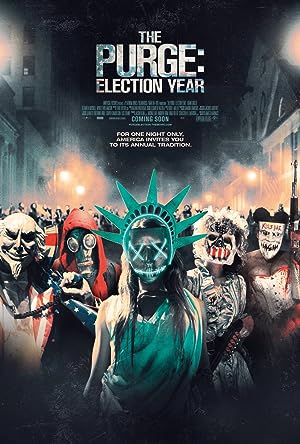I did not want to see The Purge: Election Year until after November 8, 2017 so I waited to see it a few days later. After watching The Purge: Election Year, I realized that Hollywood’s version of an American dystopian future had a happier ending and more justified confidence in a functional political system than real life—other than the rampant murder of course.
The Purge: Election Year is the third (and final?) entry in the franchise about an American system whose foundation is an annual night when anything goes, and I’m not talking about Cole Porter shenanigans and late night parties for flappers. Each installment in The Purge franchise pulls back to give the viewers an understanding of how the system works. The Purge: Election Year examines the sick intermingling of government, the economic upper class and syncretistic Christian pagan blood sacrifice cult uses the purge to literally and figuratively exsanguinate the poor of their blood and money to satisfy their greed.
The Purge: Election Year introduces an early victim and survivor of the first purge who wants to put an end to their prosperity blood gospel. She also happens to be a senator and is running to be president of the United States. Sound familiar? The New Founding Fathers decide to use the Purge to eliminate the opposition. The Purge: Election Year shows how a character from The Purge: Anarchy and the people exploited by this system band together to survive and strike a legal blow against the corrupt system by insuring that the senator also lives to fight in the polls.
The Purge: Election Year is better than the first movie, but not as great as the second. Why? First, they are still holding elections during The Purge and did not just declare martial law?!? The New Founding Fathers went through all that trouble to overthrow the American government and establish an annual night of murder and mayhem, but kept an electoral system that would leave them vulnerable. We should be so lucky in a few years. Ahem.
Second, The Purge: Election Year has too much faith about its political system. The same people who gleefully participate annually in a night of chaos are going to vote against it or vote at all? And even if they did vote against it, the New Founding Fathers are pro murdering a candidate, but not tampering with the polls? Real life says no. Also the New Founding Fathers candidate is a true believer instead of a hypocrite who says one thing then lives a different life. I wish that our real life politicians had so much integrity.
Third, The Purge: Election Year makes the first two mistakes because it is innately conflicted with sympathy to the initially violent rebels (of color), but not wanting to justify a violent uprising against even a corrupt government. Listen The Purge franchise, you made this problem, and now you’re freaked out by the implications. You want viewers to abide peacefully within the confines of a system that you painted as irredeemably corrupt while recognizing that some level of self-defense and violence is necessary to survive assassination attempts. Maybe it just occurred to you that your franchise is something that you don’t want viewers to empathize with and apply in real life, but you should have thought of that during The Purge: Anarchy. You are officially schizophrenic in your sympathies and ideals, maybe because you know or are more like the New Founding Fathers or the idea of a bunch of armed survivors of systematic victimization actually scares you.
Fourth, The Purge: Election Year needed to give me more Laney, i.e. “Pequeña Muerte.” I would love a spin off to examine how this Xena-like figure stopped from reveling in the purge as a bloodthirsty warrior to saving people from it. I was more interested in her story than anyone else. You can’t give me a badass black woman and not expect me to want more.
At least The Purge: Election Year did borrow some elements from real life. The Purge: Election Year showed foreign purgers trying to stop the senator and opportunistic and exploitive cost prohibitive insurance rate increases. As always, black people sacrifice themselves to save the nation.
The Purge: Election Year does a great job with casting and wisely carries over characters from prior installments into this one. Elizabeth Mitchell is a welcome addition to the franchise. Since Lost, Mitchell has been giving performances of calm, quiet yet steely figures of female leadership. If The Purge: Election Year is indeed the final installment in the franchise, it is not the weakest or best entry, but it is a serviceable one that faithful followers will enjoy. People who only have time to watch one entry should just watch The Purge: Anarchy and skip The Purge: Election Year. I would not mind rewatching all three entries in one night to consider the quality of the overall franchise.
Stay In The Know
Join my mailing list to get updates about recent reviews, upcoming speaking engagements, and film news.





